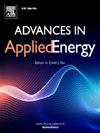Global sensitivity analysis towards non-invasive parameterization of the electrochemical-thermal model for lithium-ion batteries
IF 13.8
Q1 ENERGY & FUELS
引用次数: 0
Abstract
High-fidelity electrochemical-thermal models are essential for performance improvement, charge/discharge strategy optimization, and the safe operation of lithium-ion batteries. However, model performance significantly relies on the accuracy of parameters, whose measurement is limited by laboratory conditions. Non-invasive methods based on relatively accessible current, voltage, and temperature data combined with artificial intelligence are promising for rapid parameterization of battery models. However, the model’s complexity and the data’s poor quality increase the difficulty of applying the methodology. To design a reasonable identification framework and obtain reliable data, the identifiability of model parameters must be analyzed under different operating conditions. This paper develops an identifiability analysis framework to investigate the impact of model parameters on voltage and temperature outputs and the impact of key operating variables, i.e., current rate and ambient temperature. By adjusting operating conditions, the sensitivity of specific parameters can be improved by two orders of magnitude. The results are discussed in detail concerning the model modeling mechanism and the physical meaning of the parameters, with a focus on improving non-invasive parameterization in terms of experimental design and identification strategy.
锂离子电池电化学-热模型无创参数化的全局敏感性分析
高保真的电化学-热模型对于提高锂离子电池的性能、优化充放电策略和安全运行至关重要。然而,模型的性能很大程度上依赖于参数的准确性,而参数的测量受到实验室条件的限制。基于相对容易获取的电流、电压和温度数据,结合人工智能的非侵入性方法有望实现电池模型的快速参数化。然而,模型的复杂性和数据的低质量增加了该方法应用的难度。为了设计合理的识别框架,获得可靠的数据,必须对不同工况下模型参数的可识别性进行分析。本文开发了一个可识别性分析框架,以研究模型参数对电压和温度输出的影响以及关键操作变量(即电流速率和环境温度)的影响。通过调整操作条件,特定参数的灵敏度可提高两个数量级。详细讨论了模型的建模机制和参数的物理意义,重点从实验设计和识别策略方面改进了无创参数化。
本文章由计算机程序翻译,如有差异,请以英文原文为准。
求助全文
约1分钟内获得全文
求助全文

 求助内容:
求助内容: 应助结果提醒方式:
应助结果提醒方式:


